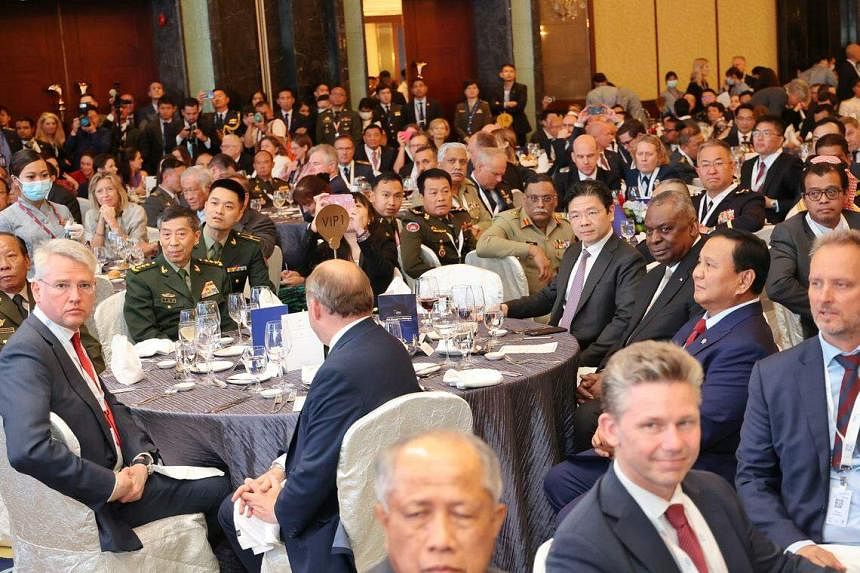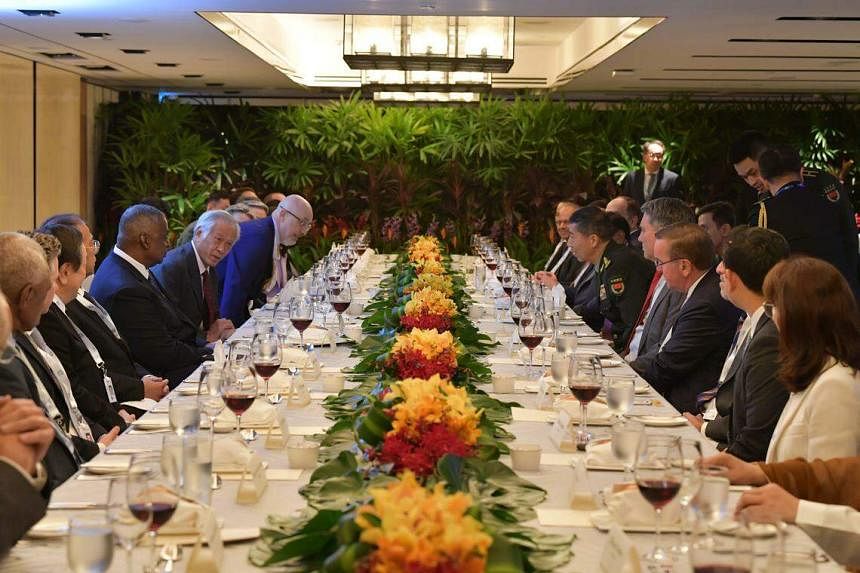SINGAPORE - Lines of communication should be established not just among friends, but more so between adversaries, said Defence Minister Ng Eng Hen, while noting that the current freeze between the United States and China was of concern.
Speaking to reporters after hosting a lunch for 29 visiting ministers and representatives at the Shangri-La Dialogue on Saturday, Dr Ng said that even two sides who are in conflict want to be able to pick up the phone and de-escalate tensions.
For instance, amid its invasion of Ukraine, Russian defence leaders can still pick up the phone and somebody will answer on the other side, said Dr Ng. The need for open lines to be maintained was true during the Cold War, and remains true in the current Ukraine conflict, he added.
“You really want to establish these lines, so obviously when you don’t have these lines, then everyone is worried.”
There has been no formal meeting between the US and China defence leaders at the three-day annual security forum that started on Friday, unlike at the 2022 dialogue, when the two sides met for close to an hour.
Even so, US Defence Secretary Lloyd Austin and Chinese General Li Shangfu sat at the same dinner table on Friday, Dr Ng noted. They also sat across from each other at Saturday’s lunch and heard each other speak.
“You get a measure of the man, their thinking, their proclivities, the temperament. Hopefully, it will add to the data bank when they do finally engage.”

Dr Ng said that from his independent conversations with each counterpart, both sides want to resume dialogue, and are working towards that objective.
“We leave it to them as to when that can be resumed and how that can be done productively,” he added.
Mr Austin, in his speech at the Shangri-La Hotel on Saturday, reiterated his call to have official talks with his Chinese counterpart. Beijing has said repeatedly that this is not possible as long as US sanctions against Gen Li – imposed in 2018 for Chinese purchases of Russian weaponry – are not lifted.
A video made the rounds online on Friday showing both leaders shaking hands around a dinner table, but the two men did not have a substantive exchange, a Pentagon spokesman later said.
Asked about potential obstacles to official talks between the two sides, Dr Ng said Singapore is not in a position to comment on the diplomatic relations between other countries, but both the US and China have said publicly that they do want open lines of communication.
“Nobody has said that ‘I don’t want to talk’. They might have said that the preconditions have not been satisfied, but that is very different,” he said.
“And I would say this: No military leader that I have met with... ever feels comfortable if (they) can’t talk to another counterpart. It is a risk, it is not an asset.”
The Ministry of Defence said a wide range of issues were discussed at the ministerial roundtable, a regular feature of the annual Shangri-La Dialogue which is holding its 20th edition this weekend. These include the lessons from the Russia-Ukraine war, the impact of US-China tensions on the Asia-Pacific region, as well as the situation on the Korean peninsula.
The ministers reaffirmed the importance of open and frank dialogue, and of upholding a rules-based international order, added Mindef. They also agreed on the importance of developing confidence-building and conflict-prevention measures, as well as maintaining open lines of communication.
On Saturday, Dr Ng also held several meetings with his counterparts on the sidelines of the Shangri-La Dialogue.
He met Japanese Defence Minister Hamada Yasukazu, and they witnessed the signing of an agreement that establishes a legal framework for the transfer of defence equipment and technology between Singapore and Japan.
This provides the Singapore Armed Forces with more options to meet its training and operational needs, said Mindef.
Dr Ng also met Cambodian Defence Minister Tea Banh, Canadian Defence Minister Anita Anand, High Representative of the European Union for Foreign Affairs and Security Policy Josep Borrell, Dutch Defence Minister Kajsa Ollongren and Portuguese Defence Minister Helena Carreiras.
On Saturday, US defence chief Austin called on Acting Prime Minister Lawrence Wong at the Treasury. Mr Austin affirmed the US’ continued support for the Singapore Armed Forces’ training in the US, and Mr Wong emphasised Singapore’s longstanding support for the US’ regional presence, said Mindef. The leaders also discussed ongoing bilateral defence initiatives and exchanged views on geopolitical developments and the regional security architecture.


